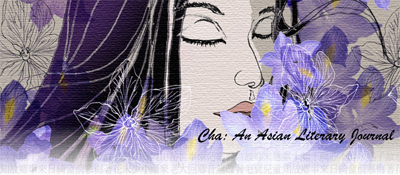Here’s some news from the literary sphere: congratulations to our friends at Kartika Review, who put up their 7th issue earlier this month, and to the editors at Cha, whose work was recently featured in this beautifully laid-out article in the South China Morning Post (that’s the prominent English-language newspaper in Hong Kong, for those who aren’t familiar with it).
I know it’s a little late in coming, but I thought this would be a good opportunity to do a brief rundown of the poetry goodness inside both Kartika Issue 7 (which features a special section devoted to Asian American writers’ reflections on the theme of “home,” and the work of a new poetry editor, Kenji Liu), and Cha‘s February 2010 Issue (which features not just great poetry, but some of the most beautiful cover art I’ve seen from them yet). I’d encourage you to read both of these issues in their entirety, of course, but here are a few thoughts about what I particularly enjoyed in each:

Kartika Review #7 is, in my opinion, the magazine’s best issue yet. I’ve really enjoyed the past two issues – but this issue really impressed with me by how quickly the publication has been getting bigger and better. The work contained in this issue’s poetry section is, in my opinion, of a more even quality than in some of the earlier issues, and new poetry editor Kenji Liu’s four choices work well as a set: each successive poem speaks to the previous one, taking up its thread in some manner or contrasting it in a thought-provoking way. The first three poems have to do with fathers and mothers and questions of inheritance, and the last – Aimee Suzara’s “We, too, made America” – expands this question to a broader “we,” claiming not just individual family histories, but a space in the broader American narrative (harkening back to Langston Hughes’ “I, Too, Sing America”). I enjoyed the compelling portrait of a man presented in Vuong Quoc Vu’s “My Father Sleeps” and the tension created between the interrogator and the respondent in Barbara Jane Reyes’ “One Question, Several Answers,” but Eugenia Leigh’s “Between Heaven and the Bedroom” was really a standout with its use of some truly knockout imagery to juxtapose the airily mythological with the small and domestic. Its opening strikes me speechless: “Somewhere in the city with her slip-proof / shoes and apron, our mom locates an angel /tall as miles.”
I also really enjoyed the special “Meditations on Home” section at the end of this issue, and appreciate that the editors thought to package it as a .PDF packet for use by educators. Oral histories like the ones contained in this issue are extremely valuable and important to preserve, and I like the idea of a classroom text that has been freshly generated and is available online at no cost to students. Several of the respondents chose to tell their stories in poems rather than in prose, and it’s definitely worth checking these responses out — especially the striking contributions by David Mura and Kelly Zen Yie Tsai.

As I mentioned earlier, the cover art on the current issue of Cha is absolutely gorgeous – I love the deep purple blooms around the woman’s face and how they seem to melt into the text of the issue itself. As usual, though, I made a beeline straight for the poetry section. One of the things I appreciate about Cha is that despite being a multi-genre journal it publishes an extensive amount of poetry in each issue. This, I’m sure, has a lot to do with co-editor Tammy Ho Lai-Ming’s being a poet herself, and it shows: the work they showcase is usually of a very consistent quality, and because there’s a relatively decent amount of room for poetry in the journal, they’re able to create a broader sense of continuity between work by both very established poets and people who are just emerging. Some of my favorites moments from this issue included the frank, unflinching language of Papa Osmubal’s “A Bum’s Demise,” and the satisfyingly mouth-thick, incantational sonics of the two poems that were contributed by Angela Eun Ji Koh: “Our Malady” and “The Harvest Shaman.” I also thought it interesting that both the current issues of Kartika and Cha featured poems involving angels (Rocco di Giacomo’s “Angels” appears in Cha, Eugenia Leigh’s “Between Heaven and Earth” appears in Kartika). Having gone back to reread Cha just before I read this issue of Kartika, it was fascinating to think of these two poems in conversation.
Many congratulations to the editors at both Kartika Review and Cha for their successful spring issues – and for the well-deserved amount of attention they’ve received for them. Please do click over to check out their respective sites. And while you’re at it – don’t forget that we at LR are building towards our own first issue; our submissions deadline is this Thursday, April 29th, and we’d love to see your work!